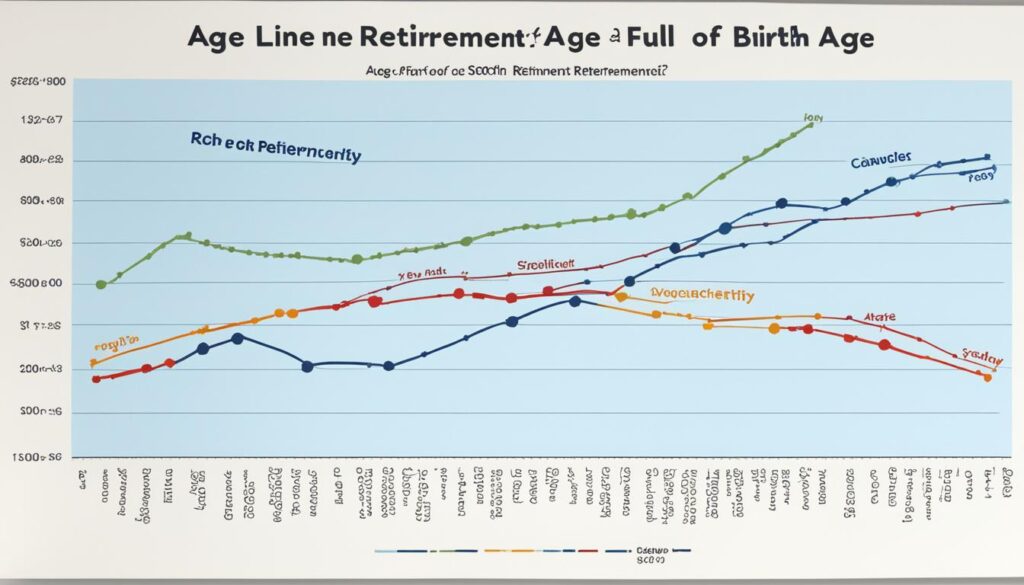Deciding when to take your Social Security benefits is important. It can really shape your future finances. One big mistake is starting too soon. This can make your benefits smaller for life. We will look into the effects of early retirement on your Social Security.
If you start Social Security before your full retirement age, your check gets smaller. This cut depends on how early you start. For instance, starting at 62 if your full retirement age is 67 means a 30% smaller check. But, holding off can make your checks bigger, thanks to extra credits for delaying.
Understanding how early retirement reduces your benefits is key. Each month before your full retirement age, your check shrinks by 5/9%. This rule applies to up to 36 months early. After that, it keeps decreasing, now by 5/12% each month. Remember, these cuts are forever and can really change how much you get when you retire.
Key Takeaways:
- Claiming Social Security early means smaller benefits.
- If you claim at 62 instead of 67, your check could be 30% less.
- Waiting past your full retirement age means bigger checks.
- Your early retirement cuts are based on how many months early you start.
- These cuts stick and could really hit your retirement income.
Understanding Your Full Retirement Age
Knowing your full retirement age is vital when you think about Social Security benefits. The Social Security Administration uses your birth year to set it. This age is key in deciding when you’ll get your full benefit.
What is Full Retirement Age?
Your full retirement age marks when you can get your whole Social Security retirement benefits. If you claim early, your monthly amount will be lower for good. But, if you wait past your full retirement age, you can get more each month with delayed credits.

How Your Birth Year Affects Your Full Retirement Age
The full retirement age keeps rising with time. It used to be 65 for all. But now, it varies by birth year. Here’s how it works:
| Birth Year | Full Retirement Age |
|---|---|
| 1943-1954 | 66 years |
| 1955 | 66 years, 2 months |
| 1956 | 66 years, 4 months |
| 1957 | 66 years, 6 months |
| 1958 | 66 years, 8 months |
| 1959 | 66 years, 10 months |
| 1960 and later | 67 years |
You can start getting Social Security at 62. But, your benefits drop if you claim before your full retirement age. Waiting till your full retirement age means you get your full benefit.
Knowing your full retirement age helps you plan your finance future. It lets you make smart choices about when to start claiming. This can help you boost your retirement income.
The Financial Impact of Early Social Security Claims
Deciding when to start claiming Social Security benefits is important. It can affect your financial future greatly. It’s key to think about how starting benefits early will change your monthly amount and long-term finances.
Reduced Monthly Benefits
Starting Social Security before your full retirement age means less money each month. The money you lose depends on how early you start. For example, if you start at 62 instead of 67, your benefit could be 30% less. This big cut affects your finances, especially if you depend on it.

Calculating Your Benefit Reduction
The reduction is based on the months you start early. Each month early equals a 5/9 percent reduction. This is up to 36 months. If you start before that, it’s 5/12 percent each month.
| Months Claimed Before Full Retirement Age | Benefit Reduction |
|---|---|
| 12 months | 6.7% |
| 24 months | 13.3% |
| 36 months | 20% |
| 48 months | 25% |
| 60 months | 30% |
Long-term Consequences of Lower Benefits
Starting early and getting less each month can hurt in the long run. Especially if you live long, you could miss out on a lot of money. If you claim at 62 with a 30% cut, it might mean a loss of over $75,000 by 85.
Think hard about your needs before choosing when to start. For some, early is best, but for others, waiting makes a stronger financial future.
Factors to Consider Before Claiming Social Security Early
Think carefully before claiming Social Security benefits early. It’s important to consider many factors. These can really affect your future finances. Even though claiming early might seem right, looking at your specific situation is key. This will help you choose based on your goals and what you need.
Your Current Financial Situation
First, check your current financial situation. If you have lots of savings or other incomes, delaying benefits could be smart. You could get a higher monthly payment by waiting. This could make your retirement income more stable.
If waiting is hard due to financial need, consider claiming early. But, make a budget first. Check if the lower amount will cover your expenses.
Life Expectancy and Health Status
Consider your life expectancy and health. If you and your family usually live a long time, waiting to claim could be better. You may get more money over your lifetime by waiting.

If health is a concern, early claiming might be best. You would get the lower monthly benefit for more years of retirement.
Spousal Benefits and Survivor Benefits
If married, think about your spouse’s benefits. When you claim, it affects what your spouse can get. The spousal benefit’s size depends on different things, like your age when claiming.
If you pass away, your spouse could get survivor benefits. Waiting to claim can increase this benefit. It can help provide your spouse more financial security if something happens to you.
| Spouse’s Age at Claiming | Spousal Benefit (Percentage of Primary Earner’s Benefit) |
|---|---|
| 62 | 35% |
| 65 | 45% |
| 66 (Full Retirement Age) | 50% |
The choice to claim early is personal. Look at your finances, health, and what’s best for your spouse. This helps you make the right choice for your retirement.=_(“Follow this link to learn more about social security.”)
Strategies to Maximize Your Social Security Benefits
As retirement nears, knowing how to maximize your Social Security benefits is key. With the right planning, you can boost your monthly benefit. This helps ensure a comfy retirement. Here, we’ll look at some smart ways to get the most from Social Security.
Delaying Benefits Until Full Retirement Age or Later
One strong method is to wait to claim until your full retirement age or beyond. You can claim as late as 70. Any delay boosts your benefit by 8% per year past full retirement age. This is thanks to delayed retirement credits.
“For every year you delay claiming Social Security past your full retirement age, your monthly benefit will increase by 8%, up until age 70. This can result in a significantly higher lifetime benefit.”
| Claiming Age | Monthly Benefit | Total Benefits by Age 85 |
|---|---|---|
| 62 | $1,500 | $414,000 |
| 67 (Full Retirement Age) | $2,000 | $432,000 |
| 70 | $2,480 | $446,400 |
Waiting until 70 gives the best monthly and lifetime benefits if you live to 85.
Working While Receiving Benefits
If you start claiming early and keep working while taking benefits, there can be some downsides. Your benefits may reduce if you earn over a certain amount; which is $21,240 in 2023. But, after your full retirement age, you could get a monthly boost to make up for the earlier deductions.
Remember, it can still be beneficial to work while getting benefits. It might increase your Social Security by counting those extra work years towards your benefits.
To get the most from Social Security, think about these strategies:
- Delay claiming until you hit your full retirement age or after
- Know how working can impact your benefits
- Work out how you and your spouse can time your claims to get the most out of Social Security
By using these strategies and staying informed, you can boost your Social Security benefits. This leads to a more financially comfortable retirement. In addition to understanding your benefits, it’s essential to consider factors like your full retirement age and the impact of claiming early. By carefully planning your retirement timeline and incorporating other income sources, you can further enhance your financial stability. Ultimately, by implementing these strategies, you will find yourself well on the path to maximizing social security benefits, ensuring a secure and enjoyable retirement.
Conclusion
Choosing when to start claiming Social Security is key in retirement planning. Tapping into benefits at the first chance, age 62, is tempting but risky. Early claiming means a slash in your benefit amount, up to 30%, leading to lower retirement income.
Before you decide, look at your own financial picture. Think about how long you may live, your health, and if spouse benefits help. For most, it pays off to wait to claim. This way, you might get more money and feel more secure later.
If you’re not sure what to do, talk to a retirement specialist. They can guide you through Social Security’s twists and turns. With the right advice, you can plan smart and enjoy a better, more secure retirement.

